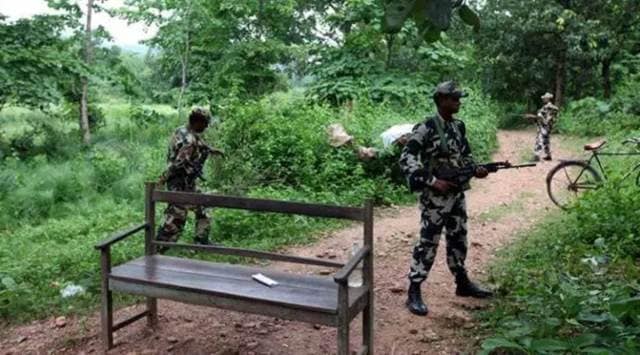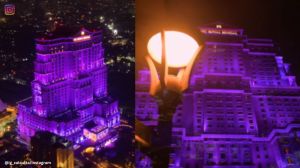- India
- International
To add bite to anti-Maoist operations, Bengal police sets up ‘SHARK’ unit
“A special 30-member anti-Maoist force has been set up by Jhargram Police in wake of recent suspicious activities in the Belpahari police station area,” a police officer told The Indian Express.
 Separate joint teams of security forces, comprising over 2,000 personnel, had launched a major anti-Maoist operation from Bijapur and Sukma districts in the South Bastar forests, considered as the Maoist stronghold, on Friday night.
Separate joint teams of security forces, comprising over 2,000 personnel, had launched a major anti-Maoist operation from Bijapur and Sukma districts in the South Bastar forests, considered as the Maoist stronghold, on Friday night.The West Bengal Police has formed a special counter-insurgency unit named “SHARK” in the state’s Jangalmahal area, where Maoist movement was reported last month after almost a decade. Ten years back, this region, comprising the districts of Purulia, Bankura, Paschim Medinipur and Jhargram, was a hotbed of rebel activities.
“A special 30-member anti-Maoist force has been set up by Jhargram Police in wake of recent suspicious activities in the Belpahari police station area,” a police officer told The Indian Express.
On September 4, about 25 Maoist posters threatening a local contractor had been found strewn on a road connecting Belpahari and Banspahar. The contractor was working on the expansion of the road. On August 13, similar hand-written posters had been found in the villages of Bhulaveda, Tongveda and Charakpahari, asking villagers to observe August 15 as “black day”. Two days later, a Maoist squad was seen in a village in the neighbouring Lalgarh area.
According to intelligence reports, the rebels are moving in from neighbouring Jharkhand to regroup in the Jangalmahal area with a possible aim of setting up a base.
“There have been some movements in the Jharkhand border area, some people are deliberately trying to create an environment of fear. To combat that, this squad has been formed. They are ready for any operation. ‘SHARK’ will work in coordination with the CIF and the CRPF. Some people are also taking advantage and spreading fake information to create more tension. One such incident was recently verified to be false,” said Jhargram SP Amitkumar Bharat Rathod.
Another senior state police official also said that the team of commandos, who have been trained in jungle warfare, would work in coordination with the CIF, or the Counter Insurgency Force, and the Central Reserve Police Force (CRPF) to target Maoists.

The squad will be deployed in all tough operations in jungles, and will also be used to fight urban terrorism and conduct hostage rescues. They have been trained to handle arms, and taught blindfold shooting. In Jangalmahal, the group will also be used to build a local information network.
“During a Maoist attack it becomes difficult for the security agencies to coordinate, and in such situations the rebels usually manage to escape. To avoid such situations, this special team has been formed with specialised training. 30 counter-insurgency police personnel with good physical fitness have been selected for this special squad. They have been put through rigorous training, and have tagged along with the CRPF for jungle operations and field training,” said a top police officer.
Following the appearance of the posters in Belpahari, the state police chief Virendra held a high-level meeting at Jhargram New Police Lines on September 5. Additional Director General of Police (Western Zone) Sanjay Singh, and other senior officials also attended the meeting.
Maoist presence in Jhargram and the other districts that make up the Jangalmahal area was at its peak between 2009 and 2011. On November 2, 2008, the rebels had targeted a convoy of then Chief Minister Buddhadeb Bhattacharjee and Union Minister Ram Vilas Paswan by triggering a landmine. Both the leaders escaped unhurt.
In 2009, a group of rebels blew up an ambulance carrying a local physician, a nurse and driver.
All Maoist activities in the area ended after CPI (Maoist) Politburo member Koteshwara Rao alias Kishenji was killed in a gun battle with security forces in Jhargram on November 24, 2011.
The Opposition has attempted to link the reports of Maoists’ return to the area to the release of current Trinamool Congress leader Chhatradhar Mahato from prison in February on bail. At the time of the Maoist insurgency 10 years ago, Mahato was the leader of the People’s Committee Against Police Atrocities (PCAPA), which had been formed by the people of Lalgarh in protest against alleged police brutalities following the attack on Buddhadeb Bhattacharjee and Paswan’s convoy. Mahato was arrested and jailed in 2009.
On August 16, at an event marking the second death anniversary of former Prime Minister Atal Bihari Vajpayee, Governor Jagdeep Dhankhar talked about Maoists’ attempts to regroup in the region. “The dangerous head of Maoism is getting visible with support of state actors,” he said.
Best of Express
Apr 18: Latest News
- 01
- 02
- 03
- 04
- 05






































